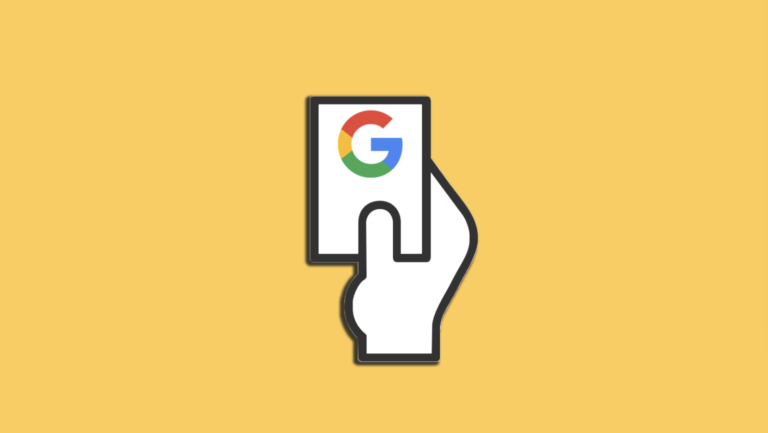Not Ranking Organically For Your Target Queries? Google’s SERP Intent Might Be Working Against You
We all know the keywords we want to rank for, but that doesn’t mean Google actually wants to rank your content for those queries. Google’s algorithm may have already decided the intent of a query directly conflicts with the page you would like to rank. By understanding SERP intent, you can help serve up a page that’s more likely to rank based on the intent of the query.
What is search intent, you ask? Well, the next time you search for something, ask yourself why you’re searching it. That would be classified as your search intent.
- Were you looking to buy something?
- Attempting to find out more information on a topic?
- Trying to pay your mortgage (womp)?
We all have a reason as to why we search what we do, and Google has been tweaking its algorithm over the years to feed users the best results based on the perceived intent of a query. This is important for Google to keep its users happy.
Why does it matter? SERP intent can seem complex, but it typically breaks down to three primary classifications: navigational, transactional, and informational. Google’s quality rater guidelines break these down into do, know, and go.
- A transactional keyword (“do”) will show results where a user can complete an action such as request a quote or add to cart. Example: “cbs all access sign up”
- An informational keyword (“know”) will show results where a user can learn more about the topic they’re searching for. Example: “how many seasons of Survivor are there”
- A navigational keyword (“go”) will get a user where they want to go – e.g. a login page, homepage, etc. Example: “cbs all access login”
Yes, I’m rewatching all 40 seasons of Survivor during the pandemic because it’s the best reality competition show ever. Don’t @ me.
It’s particularly important to understand the intent of a query because this understanding will directly influence the type of page you’ll want to create (or remake) to have the best opportunity to rank.
And remember, it’s not necessarily what you think the intent of the keyword is. It’s what Google’s algorithm thinks is the intent of the keyword. Google is still learning, so the two understandings don’t always match up. Let Google SERPs be your guide.
- If you think a keyword is transactional, but Google shows all informational results, then you’re going to be fighting an uphill battle if you want to get an ecommerce category or product page to rank.
- Similarly, if you sell lead management software and Google tends to rank review engines like G2 Crowd and Capterra, you might have a hard time ranking your lead management services page organically.
How do you fix this? create the type of page Google wants to see. Don’t go against the grain, and you’ll have a far better chance of high ranking visibility.
How to identify the SERP intent of a query
Once you’ve identified what your primary keywords are (ala keyword research) conduct Google searches for those keywords. From there, you should be able to see how Google classifies the intent of those keywords.
- Are you seeing ecommerce-based category and product pages ranking?
- Are you seeing articles from various publications, affiliates, etc.?
- Are you seeing comparison and affiliate sites ranking?
In the example below for the keyword “humidifier”, you might be surprised to see any results other than ecommerce, as you’d expect someone searching for the term to be interested in buying. However, when you review the SERP, you can see a wide variety of pages ranking including major ecommerce retailers, affiliate sites, and health publications (interesting!). This is likely because Google’s algorithm can’t even determine the intent of the SERP, being that the keyword is so broad. So, they serve up a little bit of everything.
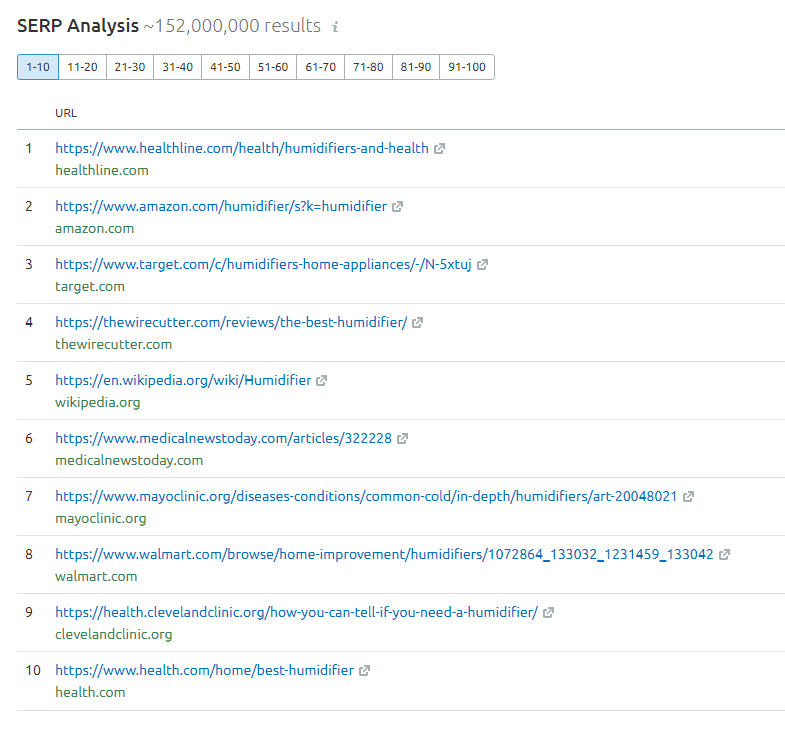
A keyword like “king size duvet covers” has a very obvious intent according to Google: transactional. All of the organic results are ecommerce based pages where users can browse and buy king size duvet covers.
Note: Often when you read about search intent, SEOs tend to classify intent based on various qualifier keywords – e.g. transactional keywords include “buy”, or informational keywords include “how do I…”. But I think it’s important to note that these qualifier keywords aren’t required for you to understand how Google classifies the intent of a keyword. As I mentioned before, let the SERP be your guide if you’re unsure how to appropriately target a keyword you want to rank for. Google the keyword, see what’s ranking on page 1, and then determine how Google sees the intent of the search. This will automatically remove any assumptions you have about the nature of a keyword’s intent. And I’m not saying Google’s intent classification is always correct — but you need to work with what you’ve got.
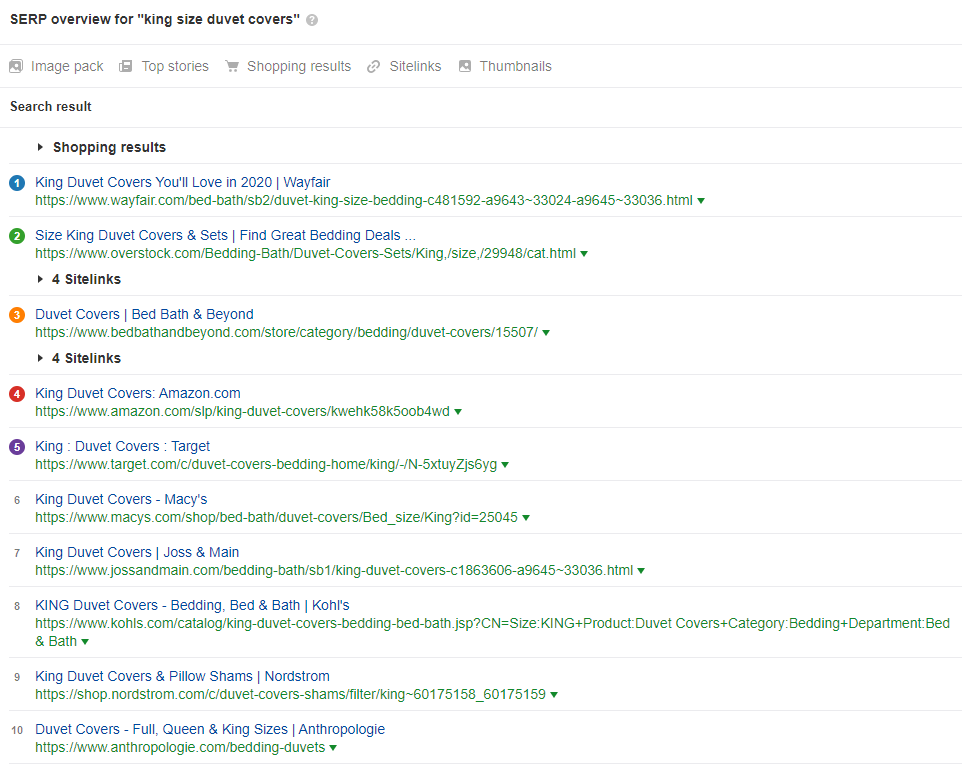
Interestingly over the years, we’ve started to see more assumed transactional intent keywords — the assumption being on the part of the human SEOs monitoring these keywords — shift over to more informational results.
A great example of this is for the keywords “duvet” and “duvets”. In 2019 we were working with a client selling duvet covers and we noticed a big drop off in their organic performance for duvet-related queries. It wasn’t until we looked more closely at the data that the SERPs shifted from almost completely transactional to a healthy mix of transactional and informational results. The top three results were now informational content about duvets, explaining what a duvet is, and comparing against other bedding types like comforters, quilts, etc.
“Duvet” SERPs in 2019
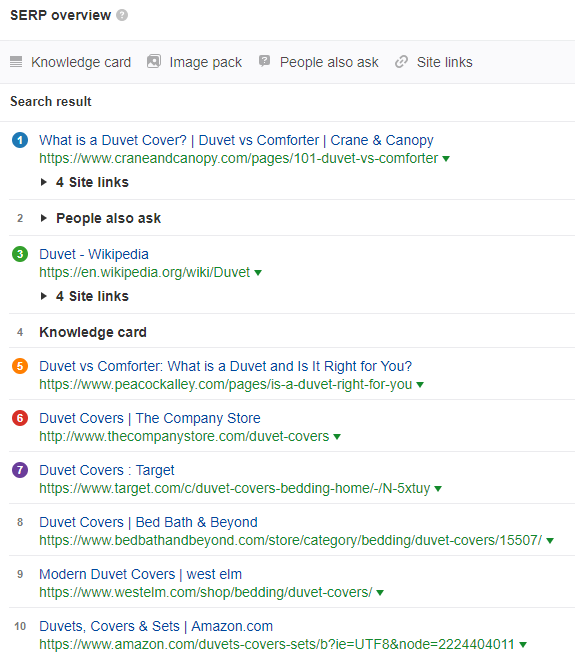
“Duvets” SERPs in 2019
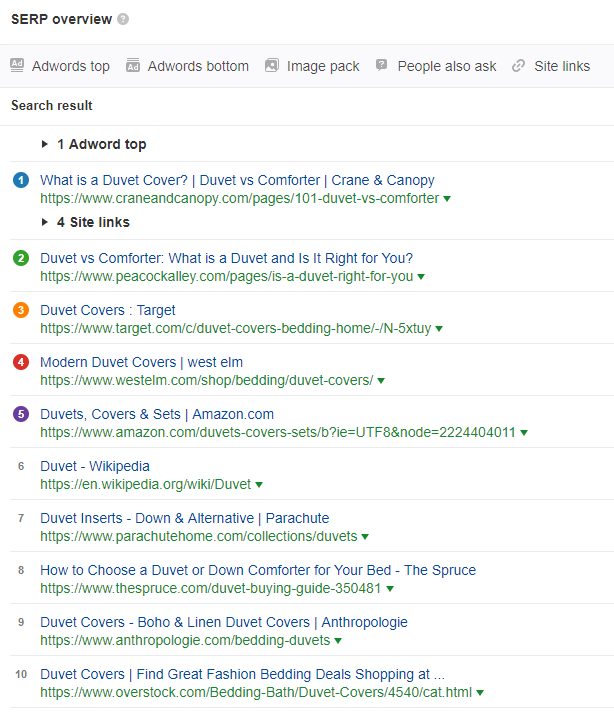
Why did the search results change? Similar to the humidifiers example above, it’s possible based on their vast data source Google found the majority of users searching for broad keywords were split between the research and the purchase stage (pogo-sticking or navigating to page 2+ of search results). Interestingly, if you look at the search results for these two keywords today, you’ll find only a single informational result.
This transactional to informational shift is bad news for certain businesses who traditionally put minimal effort into producing informational style content, instead focusing SEO efforts on ranking category/product pages, services pages, etc. It’s quite possible your site simply can’t compete for queries they used to be eligible to rank for due in part to how Google determines the intent of your target queries. We’ve seen this shift greatly impact ecommerce client performance with very broad product offerings (think: clothing or home furnishings), as well as many of our SaaS clients. Fortunately, a quality SEO agency should be able to help you navigate these uncertain SERP waters.



